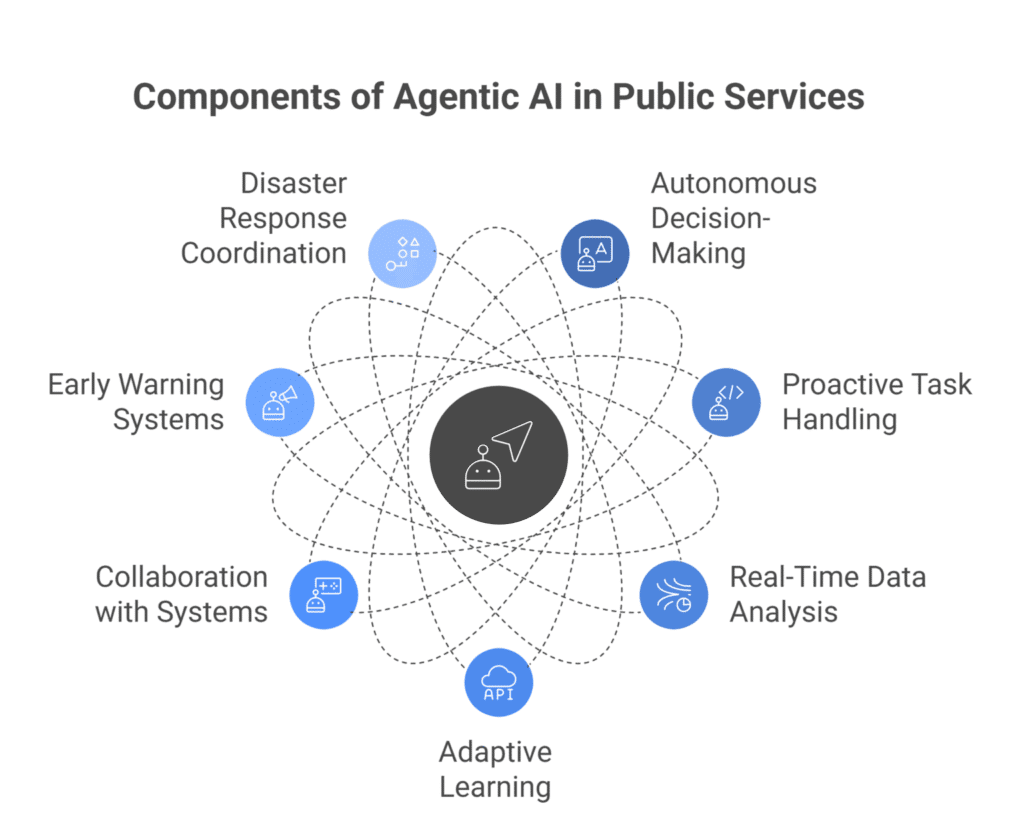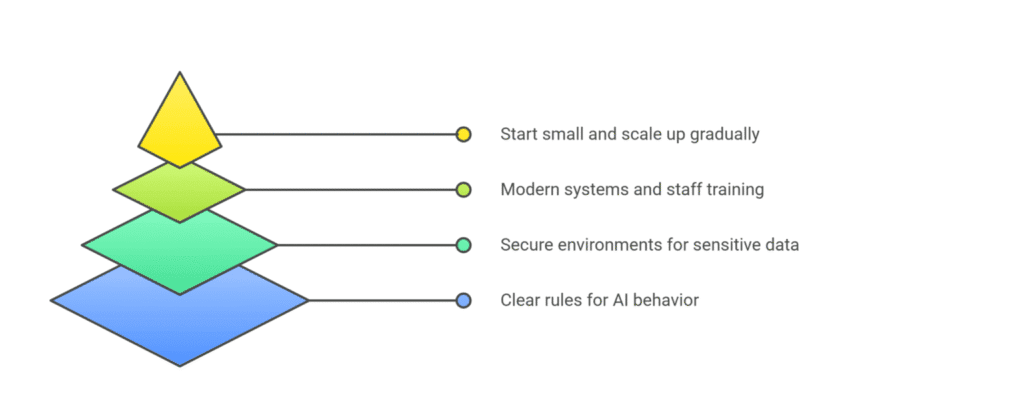
How Agentic AI Improves Public Services in e-Government?
Imagine a world where government services anticipate your needs. A world where permits get processed overnight by digital assistants, traffic lights self-adjust to prevent jams, and citizens receive proactive alerts about services they qualify for all without needing to step into an office. This is the promise of agentic AI in e-government: intelligent AI agents working autonomously to improve public services. Far from the simple chatbots of the past, agentic AI represents a transformational leap in how governments can serve their communities.
What Is Agentic AI in the Public Sector?
Agentic AI refers to AI systems that act as autonomous “agents,” making decisions and taking actions to achieve defined goals without constant human direction. In the context of agentic AI in public sector, this means AI that doesn’t just answer questions, but proactively handles tasks.
These agents can reason, adapt, and collaborate with existing systems. For example, an AI agent might monitor public health data to issue early warnings about outbreaks, or coordinate disaster response logistics by automatically scheduling resources where they’re needed most. Unlike a basic scripted bot, an agentic AI has the freedom to analyze real-time data and learn on the job, adjusting its actions based on feedback and changing conditions. In short, it’s an AI that not only responds but also initiates and plans a game-changer for digital governance and government digital service modernization.

From Chatbots to Autonomous Agents
When many people think of AI in government, they picture chatbots handling routine inquiries or automated form processing. Those tools are helpful, but agentic AI takes it a step further.
Imagine a virtual assistant that not only answers a question about your driver’s license but can also file the renewal paperwork on your behalf, check for any outstanding fines, and schedule your road test appointment all in one interaction.
That’s the level of service ai agents for government can provide. These AI agents operate with context-awareness and can make decisions on the fly, not just follow a script. By continuously learning from new data and user interactions, they provide dynamic, personalized support, leading to a significantly better citizen experience. For policy-makers, this means going beyond simple automation into proactive digital transformation.
How Agentic AI Improves Public Services
Government agencies are discovering numerous ways that agentic AI in public sector initiatives can enhance services in the era of e-government. Here are some key improvements:
Enhanced Decision-Making:
AI agents deliver real-time insights by analyzing vast data sets instantly. They help officials make informed decisions faster. For instance, AI agents can sift through traffic data to help city planners optimize routes and reduce congestion. Public health agencies can deploy AI agents to scan epidemiological data and flag emerging health risks early. These data-driven insights lead to smarter policies and proactive governance. In fact, over one-third of public service executives expect ai agents for government projects to play a significant role in strategic planning and innovation in the next few years.
Workflow Automation & Efficiency:
Agentic AI excels at automating complex, multi-step workflows across government systems. Rather than just automating one task, an AI agent can handle an entire process end-to-end. For example, in an environmental agency, an AI agent could receive a permit application, verify the data against multiple databases, request any missing information from the applicant, and even issue preliminary approvals all autonomously. This level of automation drastically cuts down processing times and reduces administrative burdens, enabling faster government digital service delivery.
24/7 Citizen Services:
With agentic AI, government services become accessible anytime, anywhere. AI agents don’t work 9-to-5 they are available around the clock. Citizens can get answers and complete transactions via intelligent virtual assistants at midnight or on weekends, when human offices are closed. For example, Missouri’s Department of Revenue launched an AI chatbot named DORA to handle FAQs about taxes, licenses, and more, providing residents help 24/7. These always-on agents mean no more waiting in line or on hold for basic services. This improves citizen satisfaction and trust.
Personalized & Proactive Support:
Agentic AI enables a shift from one-size-fits-all services to personalized citizen experiences. Because these AI agents can integrate data from various sources, they can tailor their assistance to each individual’s situation. Consider an AI agent in a social services department: it could proactively notify a family about a benefit they qualify for, help them auto-fill the application, and follow up to ensure they receive the support. This kind of proactive service makes citizens feel valued and aligns directly with citizen demand for smarter government ai solutions.
Improved Public Safety and Response:
In emergency and security scenarios, agentic AI can be a lifesaver. Intelligent agents can monitor feeds from sensors and cameras to detect incidents (like accidents, floods, or suspicious activities) in real time and immediately alert the right responders. They can also coordinate responses across agencies. For example, an agentic AI in disaster management could automatically pull data from weather systems, predict where resources will be needed, and dispatch alerts and supplies to those areas.
Augmenting Government Employees:
Agentic AI isn’t about replacing public servants it’s about empowering them. These AI agents act as digital colleagues, handling the heavy lifting of data processing and routine transactions, so human officials can focus on complex decision-making and human-centric work. In this sense, agentic AI serves as a digital workforce multiplier. By automating low-level tasks, AI agents enable staff to focus on high-value work, ultimately delivering more innovative and impactful government ai solutions.
Key Considerations for Implementing Agentic AI

- Governance and Ethics: With AI making autonomous decisions, strong governance is essential. Agencies need to set clear rules and ethical guidelines for AI behavior. Transparency and accountability are critical for public trust.
- Data Security & Privacy: Agentic AI systems thrive on sensitive citizen data. Deploying them in secure, controlled environments is vital. Encryption, access control, and reliable government ai solutions ensure that AI improves services without compromising citizen rights.
- Infrastructure & Skills: To succeed with advanced AI agents, agencies may need to invest in modern infrastructure and staff training. Robust IT ecosystems and AI literacy programs prepare the workforce for effective adoption.
- Phased Implementation: A practical approach is to start small and scale up. Pilot projects in low-risk areas demonstrate early wins, which can be expanded as trust and experience grow.
Conclusion: Embracing the Future of e-Government
Agentic AI is poised to be a game-changer for public services. By moving beyond static websites and basic chatbots to goal-driven AI agents, governments can deliver services that are faster, smarter, and more responsive to citizens’ needs. The public sector has a unique opportunity to harness these innovations to not only increase efficiency but also reimagine the citizen experience in a more personalized and proactive way.
Forward thinking leaders are already exploring the possibilities. The consensus is clear it’s not a question of if but when. Embracing this technology now can help agencies stay ahead of rising citizen expectations and complex challenges.
Ready to introduce AI agents into your organization? It’s time to start planning your strategy. By investing in government ai solutions and modernizing your government digital service delivery, leaders can unlock new levels of service excellence. Don’t wait for the future to arrive take action now to leverage agentic AI in public sector transformation.
Frequently Asked Questions
What is agentic AI in the public sector?
Agentic AI in public sector refers to AI systems that act as autonomous agents, capable of making decisions, adapting, and completing tasks for citizens and government staff without constant supervision. App Maisters helps government agencies implement such intelligent solutions through certified government ai solutions.
How can AI agents improve government services?
AI agents for government can automate complex workflows, provide 24/7 support, and deliver personalized citizen experiences. With our ISO 9001 & ISO 27001 standards, App Maisters designs secure government digital service platforms powered by agentic AI.
Are AI agents safe to use in government operations?
Yes, when deployed with strong governance, data security, and ethical frameworks, agentic AI is safe. At App Maisters, we ensure all implementations of agentic AI follow strict compliance standards while improving efficiency in the public sector.
What problems can agentic AI solve for government agencies?
Agentic AI can cut down processing times, enhance public safety, and provide proactive citizen services. App Maisters has expertise in delivering government ai solutions that support smarter workflows and policy decision-making.
Why should governments work with App Maisters on agentic AI?
App Maisters is ISO 9001 & ISO 27001 certified, with over a decade of experience delivering government digital service platforms. We specialize in implementing agentic AI for public sector agencies, helping them modernize services with trust, security, and innovation.






